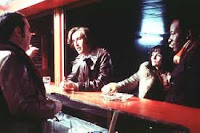Well, a hugely grossing comedy (at the time) and your first (of seven) Oscar nominations is a pretty good way to break out, really, isn't it? Robert Altman really made a name for himself with MASH , kicking off a long and generally acclaimed (and very prolific) career with a huge fight with his studio - well done. But the film that came out of the scandal did nab an adapted screenplay Oscar, with four other noms.
, kicking off a long and generally acclaimed (and very prolific) career with a huge fight with his studio - well done. But the film that came out of the scandal did nab an adapted screenplay Oscar, with four other noms.

The initials MASH stand for Mobile Army Surgical Hospital, and the film takes place in one on the frontlines of the Korean War - despite Altman removing all references to Korea in the hope that the setting would be mistaken for Vietnam, which was still raging at the time, Fox insisted on an opening crawl identifying the location. The film, like the subsequent television series, is episodic, so while the story revolves around new arrivals Hawkeye (Donald Sutherland) and Duke (Tom Skerritt) and their hijinks and exploits in and around the camp, there are a number of smaller, distinct and complete storylines that are interspersed and feed into this overarching narrative. Sally Kellerman picked up a supporting actress nod for her role as the new head nurse, quickly dubbed 'Hot Lips' O'Houlihan after exploits with Hawkeye and Duke's tent-mate Major Frank Burns (Robert Duvall), who otherwise thoroughly disagrees with the new pair's debauched womanising and drinking ways.
While the film is a comedy, there are some moving moments in it, as would be expected within a war film, and they are deftly handled by Altman and his cast (many of whom, outside the big names, were releatively inexperienced within film and were brought in due to their experience with adlibbing in clubs), including a story about a Polish dental surgeon who is depressed due to the fact that he has a very large penis and this means won't sleep with him, and this depression turns to suicidal desires. Our protagonists organise a fake suicide for him, and then organise for a nurse to sleep with him that night, thereby curing his depression. While broadly comic, the sentiment is touching.
The performances are very good, including a turn from Elliott Gould as Trapper, the third part of the Hawkeye/Duke machine. Altman, ever innovative, used overlapping dialogue from as many as four parallel conversations to bring across the messiness and confusion of war, something that worked extremely well, adding realism to the surreality of the comic placement. A grimy looking set was perfect, again dragging the film back to reality, with the operating scenes suitably gory, despite the disrespectful laughter forced out of you at every turn.
A truly entertaining anti-war film set within a war, Altman deservedly made a name for himself that would live on for three more decades and bring with it many more classic titles. 4.5 stars.






















